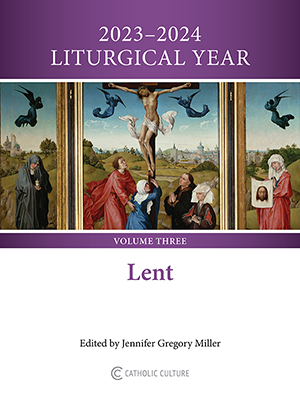Pope Francis, Ecumenical Patriarch sign joint declaration, lament persecution of Christians
December 01, 2014
In an urgent appeal for Christian unity, Pope Francis told an Orthodox congregation in Constantinople that the Catholic Church "does not intend to impose any conditions except that of the shared profession of faith" and pointedly remarked that the Bishop of Rome "presides in charity."
On the evening of November 29, the Pontiff joined Ecumenical Patriarch Bartholomew I of Constantinople at a prayer service in the Church of St. George in Istanbul.
The patriarch, who was installed in 1991, holds a primacy of honor among the heads of the Eastern Orthodox churches.
“Your advent here, being the first since the recent election of Your Holiness to the throne that presides in love, constitutes a continuation of similar visits by your eminent predecessors Paul VI, John Paul II and Benedict XVI, but also bears witness to your own will and that of the most holy Church of Rome to maintain the fraternal and stable advance with the Orthodox Church for the restoration of full communion between our churches,” the Patriarch said.
“My venerable and dear brother Bartholomew, as I express my heartfelt ‘thank you’ for your fraternal welcome, I sense that our joy is greater because its source is from beyond; it is not in us, not in our commitment, not in our efforts – that are certainly necessary – but in our shared trust in God’s faithfulness which lays the foundation for the reconstruction of his temple that is the Church (cf. Zech. 8:9),” the Pope said. He concluded by bowing his head and saying, “I ask a favor of you: to bless me and the Church of Rome.”
The following day, after celebrating Mass privately at the apostolic delegation in Istanbul, Pope Francis returned to the Church of St. George, where he delivered an address during the Divine Liturgy.
“Meeting each other, seeing each other face to face, exchanging the embrace of peace, and praying for each other, are all essential aspects of our journey towards the restoration of full communion,” the Pope said. “All of this precedes and always accompanies that other essential aspect of this journey, namely, theological dialogue.”
He added that the hoped-for restoration of full communion
does not signify the submission of one to the other, or assimilation. Rather, it means welcoming all the gifts that God has given to each, thus demonstrating to the entire world the great mystery of salvation accomplished by Christ the Lord through the Holy Spirit. I want to assure each one of you here that, to reach the desired goal of full unity, the Catholic Church does not intend to impose any conditions except that of the shared profession of faith. Further, I would add that we are ready to seek together, in light of Scriptural teaching and the experience of the first millennium, the ways in which we can guarantee the needed unity of the Church in the present circumstances.
The voices of the poor, the victims of conflicts, and the young “implore our churches to live deeply our identity as disciples of the Lord Jesus Christ,” the Pope stated.
Following the liturgy, the Pope and the Ecumenical Patriarch signed a common declaration.
“We express our sincere and firm resolution, in obedience to the will of our Lord Jesus Christ, to intensify our efforts to promote the full unity of all Christians, and above all between Catholics and Orthodox,” they said. “As well, we intend to support the theological dialogue promoted by the Joint International Commission, instituted exactly 35 years ago by the Ecumenical Patriarch Dimitrios and Pope John Paul II here at the Phanar, and which is currently dealing with the most difficult questions that have marked the history of our division and that require careful and detailed study.”
The two also lamented the situation of Christians in the Middle East.
“We can say that there is also an ecumenism of suffering,” they stated. “Just as the blood of the martyrs was a seed of strength and fertility for the Church, so too the sharing of daily sufferings can become an effective instrument of unity. The terrible situation of Christians and all those who are suffering in the Middle East calls not only for our constant prayer, but also for an appropriate response on the part of the international community.”
Later on November 30, before returning to Rome, Pope Francis met with refugees assisted by Salesians in Istanbul and visited the Armenian Patriarch of Constantinople in the hospital. Patriarch Mesrob II Mutafyan has led his Oriental Orthodox patriarchate since 1998.
“The degrading conditions in which so many refugees are forced to live are intolerable,” the Pope told the refugees. “For this reason, we must do everything possible to eradicate the causes of this situation. I appeal for greater international cooperation to resolve the conflicts which are causing bloodshed in your homelands, to counter the other causes which are driving people to leave their home countries, and to improve conditions so that people may remain or return home. I encourage all who are working generously and steadfastly for justice and peace not to lose heart.”
For all current news, visit our News home page.
Further information:
- Apostolic Journey of Pope Francis to Turkey (Holy See)
- Thronal Feast: Visit of Pope Francis to the Phanar (Ecumenical Patriarchate)
- Pope Francis visits Armenian Patriarch in Istanbul hospital (Vatican Radio)
All comments are moderated. To lighten our editing burden, only current donors are allowed to Sound Off. If you are a current donor, log in to see the comment form; otherwise please support our work, and Sound Off!
-
Posted by: TheJournalist64 -
Dec. 02, 2014 6:03 AM ET USA
This sounds promising. The Anglicans have gone off to make a "church" unlike anything the Apostles would recognize, and even the SSPX seems intransigent. Perhaps the catastrophe of 1054 can be undone in our lifetimes? Wouldn't that be a witness to a fragmented world?








